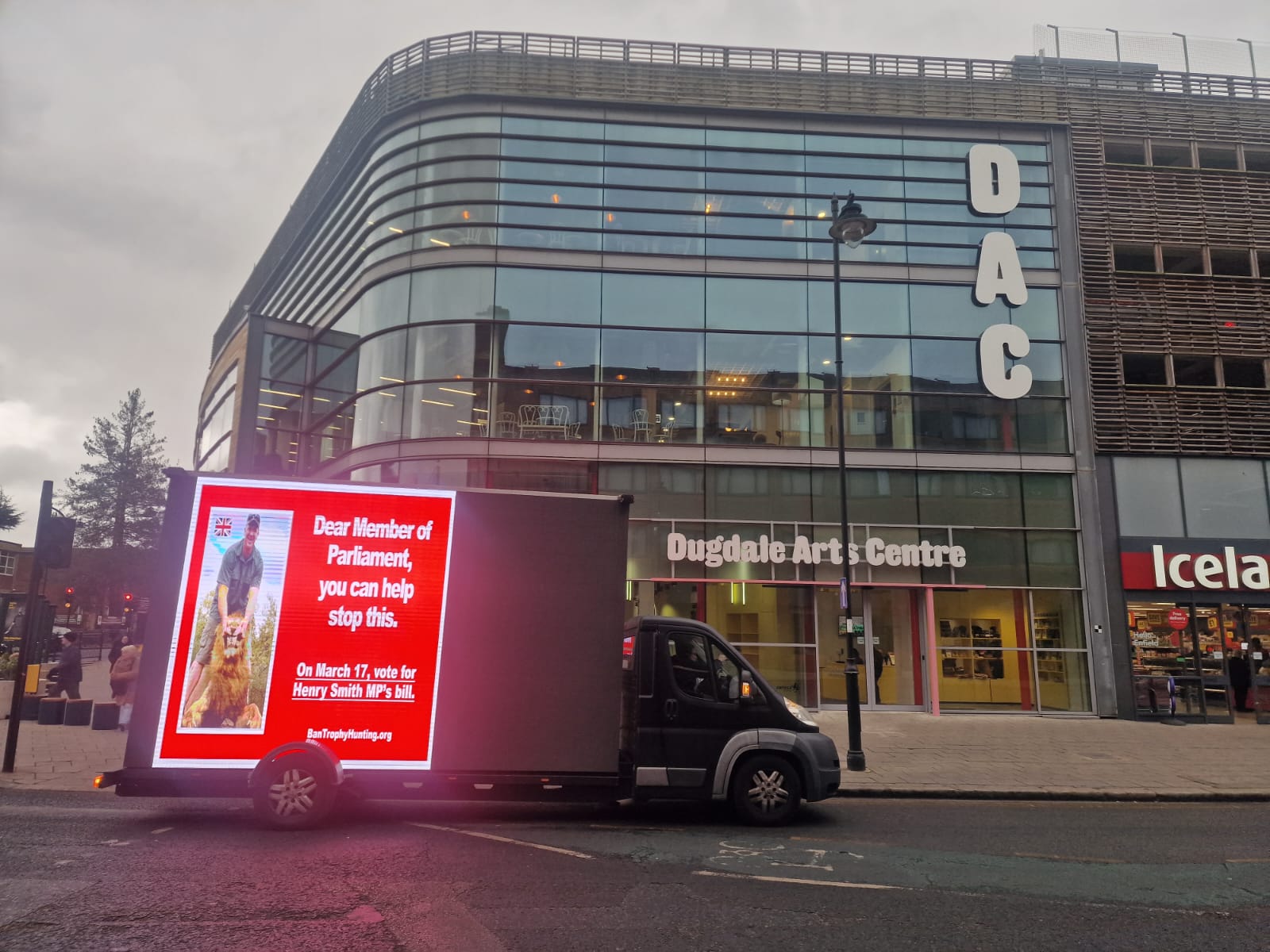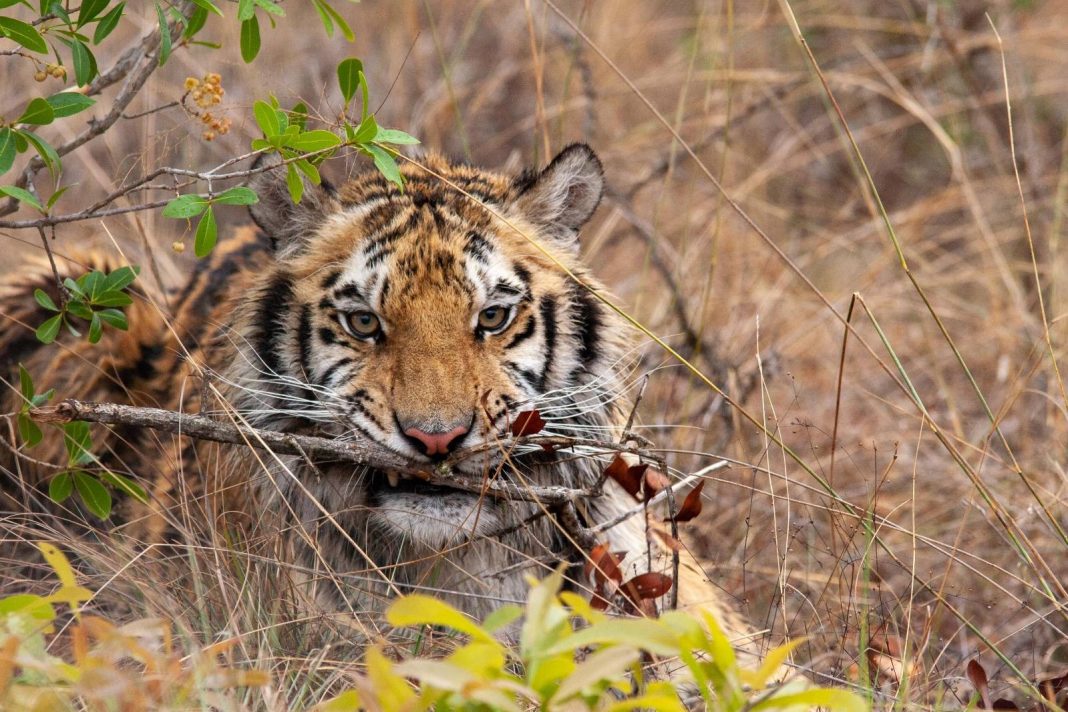Several high-profile celebrities, including Dame Judi Dench, Ricky Gervais, Liam Gallagher, Kate Moss and Ed Sheeran, are urging MPs to vote for an unprecedented trophy hunting ban on March 17th
The government bill, called Sally’s Law in honour of a tiger cub who was rescued from being slaughtered, aims to ban British trophy hunters from bringing home the bodies of innocent and defenceless animals they murder for ‘fun’.
A number of high-profile celebrities, including Dame Judi Dench, Ricky Gervais, Liam Gallagher, Kate Moss and Ed Sheeran, have signed the petition. The full list of celebrities who have signed the campaign can be found here.
Sir David Attenborough commented on the proposed ban: “For species such as elephants and rhinos to be fighting for their existence due to human exploitation and interference is unacceptable, and we must do everything within our power to turn this dire situation around.
We are responsible for the problem, and we must be held responsible for the solution
“We are responsible for the problem, and we must be held responsible for the solution. It will indeed be a very sad indictment on our species if rhinos and elephants are no more, and that day will come sooner than we think if we do not take action.”
As well as a wave of celebrity supporters, a recent poll revealed that 9 out of 10 Brits want their MPs to cancel their constituency plans and get to parliament to vote in favour of the ban at 9.30am on Friday 17th March. If passed, this bill will be the toughest legislation implemented by any government in the world and will send shock waves across the trophy hunting industry.

Hundreds of endangered animals are killed by British trophy hunters every year
Hundreds of endangered animals are hunted by British trophy hunters every year, including:
- Lions
- Elephants
- Giraffes
- Polar bears
Current legislation allows trophy hunters to bring dead animals home to Britain for taxidermy and trophy purposes.
Campaign to Ban Trophy Hunting founder, Eduardo Goncalves, added: “Many people are shocked to learn trophy hunting still goes on. Survation’s results reflect people’s clear views on this issue. It’s critical that people encourage their local MP to attend the House of Commons on March 17th to enact the world’s strictest legislation and help prevent the brutal killing of innocent animals.”
Take Aim Safaris: Trophy hunting ‘holidays’ in Africa
Over the past four decades, British hunters have brought home approximately 5,000 trophies of animals classed as endangered by CITES, the Convention on International Trade in Endangered Species.
It may sound shocking, but many British companies operate trophy hunting ‘holidays’ in Africa. Take Aim Safaris is owned by Surrey-born Carl Knight, a hunter who admits to having personally gone on more than 400 trophy hunts. Knight has shot and killed and shot many of Africa’s most recognisable and endangered wildlife, from lions, elephants, rhinos, and leopards.
The Campaign to Ban Trophy Hunting was set up in 2018 by Eduardo Goncalves, former WWF International Director Jean-Paul Jeanrenaud, legendary explorer Sir Ranulph Fiennes OBE, and actor and leading animal advocate Peter Egan, and to date, has garnered cross-party support and endorsement by big celebrity names including Dame Joanna Lumley, Dame Judi Dench and Ricky Gervais.
Sir Ranulph Fiennes’ letter to ban British trophy hunting
Sir Ranulph Fiennes, Ambassador for Campaign to Ban Trophy Hunting, has urged our readers to sign the campaign.
He pointed out, “We often think trophy hunters are just Americans like the awful dentist Walter Palmer who shot Cecil the lion. However, British trophy hunters are shooting lions, elephants, giraffes and hippos. Some British hunters have singlehandedly killed hundreds of animals.”
With British trophy hunters shooting some of the world’s most endangered animals, including rhinos, cheetahs and polar bears, something needs to change.
“It is time to put an end to this disgrace. Trophy hunting is vile. It is carried out by cowards who bring shame upon our nation. I cannot think of anything less British than killing an innocent, defenceless animal purely for pleasure” pointed out Fiennes
The bill coming to Parliament on March 17, aims to stop British hunters bringing home their ‘souvenirs’ of animal bodies, heads and skins. It has the support of both the government and opposition parties. It also has the strong backing of voters.
“Survation has just conducted a poll which asked voters if they thought their local MP should come to the Commons and vote for it. The results are unequivocal. Over 8 out of 10 constituents want their MP to ensure this ban is put in place” according to Fiennes. “MPs are there to represent us. If readers want this bill to become law, they should – politely but firmly – demand that their local MP go to Parliament on March 17 and vote for it.”
Enter your postcode here to send an automatic message to your local MP, asking them to attend the vote and seal this proposed change into law.












“Sally” is a cheap political publicity stunt – a tiger purchased from a lion farm in South Africa. It wasn’t “rescued” or “under cover” – that part is fictitious and, like “Sally’s Law” , does not exist. There are hundreds for sale. This isn’t a law – it is a rather pointless private members bill to prevent the importation of hunting trophies. It is unscientific nonsense – the list includes mosses, insects and frogs, agricultural pests and common animals raised for meat.
You cannot ban trophy hunting. Trophy hunting is just a normal part of hunting , except a trophy is kept. The rest of the animal is eaten. We shoot 350,000 deer in the UK and visiting hunters take home 20,000 trophies annually. The deer are eaten. Africa is no different, so they find this campaign very hypocritical and even neo-colonialist.
In Southern Africa, farmers discovered that it is more profitable to raise wild animals for live sales, hunting and meat than raise cattle on poor, dry soils. So, they turned 40 million acres of previous cattle farms back into bush – private hunting reserves. There are more than 10 million huntable wild animals on those private reserves (where there was only half a million fifty years ago) and over a MILLION are shot every year, producing 17,000 jobs and 50,000 tons of low carbon, low water, free range organic meat. Less than 1% yield a trophy – all of them are subsequently eaten or used. Nothing goes to waste in Africa. What is this fuss all about?
More than 2 million animals are born on the hunting reserves, so the numbers keep going UP, no down. These animals are not included on the endangered lists because they are privately owned – they are extra to and cover twice the area of the huge National Parks like the Kruger. They are raised for hunting, therefore NOT “endangered”, and to claim so is deceptive.
To a rancher or tribesman who sells wild animals for hunting, a trophy hunter pays well, takes home the horns and skin (usually thrown away) and leaves the valuable meat for local consumption.. Far from “a bad name”, trophy hunters are VERY welcome in remote places where no other alternative income exists. These are FACTS.
If a ban was put in place, farmers’ income from trophy hunting would cease. You might be happy. But now cattle become more profitable, so all of the wildlife will be destroyed and replaced by cattle. Farmers have to live. Your silly ban got 10 million large animals destroyed. But, worse still, those 40 million acres of bush used for hunting support trillions of animals, birds, reptiles, plants and trees that are not hunted. That is the conservation benefit of hunting . Ban hunting and they would go too, just like the Amazon, replaced by cattle and crops. The jobs and meat would go as well, impoverishing some of the poorest people in the world. Is that what you are voting for?
There are 100,000 too many elephants across their southern range (measured solely by the damage they do to the habitat). They are NOT endangered. Likewise the Southern Giraffe – 30,000 and farmers can raise as many as needed. They are not endangered. Lions are raised on lion farms and sold to whoever wants them. If you want to buy and hunt one, it must be feral – self-supporting, non-habituated to humans, released in a minimum of 2000 acres. That’s the law. Only one or two wild born lions are available for hunting anyway – they are old or problem lions, escapees from reserves or stock killers. They would be shot anyway. None are endangered, and farmed lions protect the wild stock from bone poachers to fill Far East demand.
The list goes on. All of the hunting activity is regulated by thousands of scientists, vets, ecologists, field managers, rangers and other professionals who know a lot more about wildlife than noisy celebrities trying to greenwash their expensive lives.
The reality is that this ban will impoverish thousands of already poor Africans and threaten the lives of millions of wild animals.
Worse still, is the lack of scientific voices in this matter – voices who could explain this to the public. It is all sentiment, political fake news.
And to our everlasting shame, there are no voices of the Africans who actually live with the wildlife. That is a disgrace. Apparently, black lives and voices don’t matter much in our government.
Hi John, I do believe you and I never finished our discussion on the Chronicle involving Mr. Koro, who has been spinning his own “misinformation” about the Loliondo situation going on where thousands of “black live’s voices” are indeed being “ignored”, but this time involving the “sustainable use of wildlife”.
My question to you is why would you accept blatant and false misinformation from someone promoting “sustainable use”, while at the same time calling out misinformation from the other side?
Regardless of scientifically-proven land degradation, this situation has been called out by many human and Indigenous right’s groups, and the best you can do is inform the British parliament about this particular situation, and maybe perhaps find better solutions that don’t directly involve shooting people’s livestock and burning their homes.
What the Tanzanian government’s doing is unacceptable, and to say that “black lives voices don’t matter much in our government”, meanwhile local Indigenous people’s voices *are* indeed being “ignored”, but by their own country’s government, is rather disingenuous coming from you.
Loliondo is a story that simply *needs* to be told, and you apparently hiding it from the British government, especially when it involves a country like Tanzania that would be affected by this bill, is, again, disingenuous.
Bravo! Spot on!
Hi Mark. Good to meet again. What has Tanzania got to do with Mr Gonçalves’ fictitious “rescued” tiger or the entirely spurious and political Private Member’s Bill to ban the importation of hunting trophies into the UK? My comment here was on the subject of this article. All I am trying to do is prevent a huge political blunder that will add to the misery of poor Africans and end up killing vast swathes of wildlife because there are no alternative income streams to replace trophy hunting and the rather novel idea of “farming” wildlife sustainably, aka the Southern Africa model of conservation hunting.
I am all for photo-tourism, too. Anything that brings income to Africa – unfortunately the Campaign to Ban Trophy Hunting does the opposite – it intercepts well-meaning money that would be better spent in Africa and gets in the way of proven conservation success because it has nothing to do with African wildlife and a lot to do with “animal justice warriors”.
Although off-topic, I understand your outrage, but the Liliondo clearances are , I believe, aimed at sharing out the land between pastoralists and wildlife tourism (consumptive or not). With the rapidly expanding population and influx, pastoralism will eventually mean more settlement, more cattle, and the eventual destruction of the habitat due to conflict/competition, as happened in Kenya when they banned hunting and have now lost 80% of their wildlife outside the reserves. If habitat is to be saved for the future, human population has to be checked in places. It is unfair on those affected, of course, but that is a problem and matter for the Tanzanian Government. How this translates into “Mr Koro spinning false information”, I have no idea. Mr Koro is, I believe, an African journalist who understands the sustainable use of wild resources, hates it being obstructed for political reasons without suitable alternative income streams for those affected, and he deserves a voice, as of course do you.
As an old bush trader and prospector across the region, now retired in the UK, my concern is not “a pretence” or even the defence of trophy hunting – it remains the economic welfare of the remote people of Southern Africa and the total UK lack of balanced debate or even any realism in this particular matter. If they were given a voice, I would shut up.
Yes, John, and this “hunting conservation” includes building a five-star hotel in this “pristine wilderness” that will no doubt cause more environmental harm than any “animal justice warrior” or British lawmaker could ever do by shooting people and their livestock and burning down legally-registered villages just so that Dubai royalty can have a field day, and that local Indigenous people are “overpopulated”.
But like what you said, “I would shut up”.
https://twitter.com/Oleshangay/status/1650087834043162624
The entire point of this discussion is for Parliament to focus rather on the Loliondo situation and help aid all the afflicted Maasai instead of these bans, and work with the Tanzanian government to find better solutions to the land degradation-issue than, again, shooting people’s livestock and burning their homes all in the name of “conservation” and the “sustainable use of wildlife”, which, apparently, the UAE get a free pass to lobby for, despite all criticisms of this bill being so-called “racist” and “neocolonialist”.
If local and Indigenous people’s voices are indeed being ignored, but by both sides of this frivolous debate, than both sides need to “shut up”.